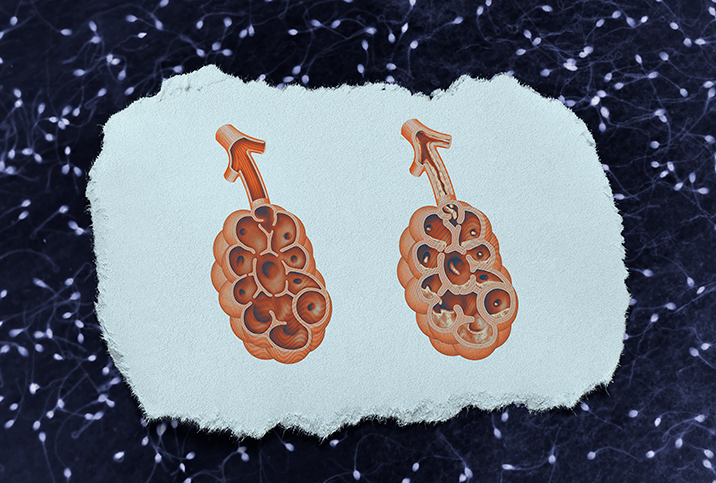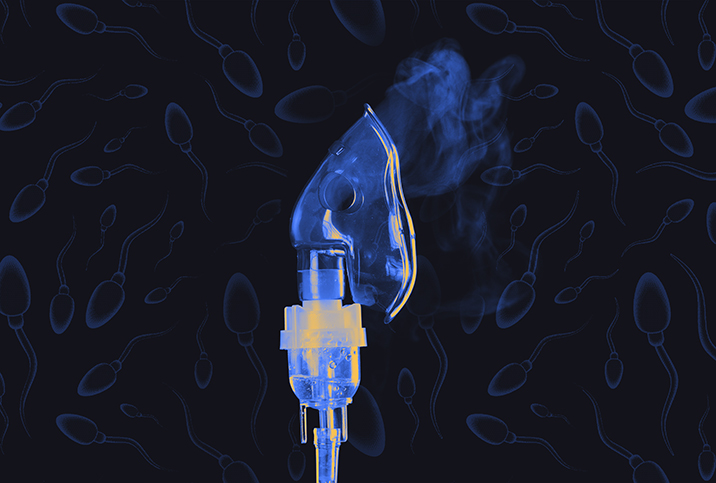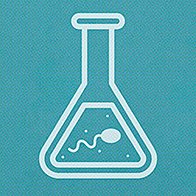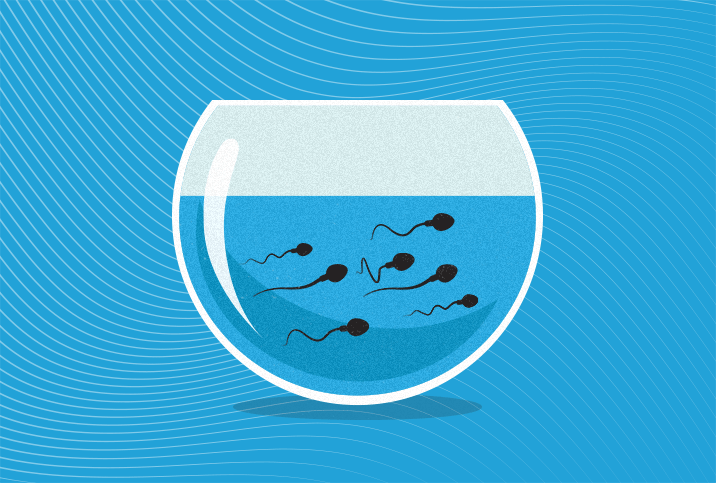Reasons for Male Infertility: Cystic Fibrosis

With numerous medical conditions, including ejaculatory problems, infections and hormone imbalances, each affecting fertility, the most common cause of male infertility is unhealthy sperm.
Many men may not realize congenital conditions can be a factor, as well. For example, cystic fibrosis (CF) is a genetic disorder that affects at least 30,000 Americans. In other words, you're born with CF—you can't catch it. However, about 1 in 20 people in the United States who carry the abnormal CF gene are unaffected and often unaware they are carriers. For this reason, some men may not discover they have cystic fibrosis until they have trouble conceiving a child.
A gene mutation causes CF, resulting in a buildup of thick, sticky mucus in the lungs, digestive system and other organs, because the gene controls the movement of salt and water in and out of the body's cells. The mucus buildup affects the entire body with a variety of symptoms, such as persistent coughing, frequent lung infections, poor weight gain, bowel problems and, eventually, permanent lung damage. Cystic fibrosis is a life-threatening disorder.
The gene mutation can also affect an essential part of the male reproductive system.
Why does CF affect fertility in men?
Let's start with a brief anatomy recap. The testicles, the epididymis and the vas deferens are the three main body parts to know regarding male fertility:
- The testicles (or testes) produce sperm.
- Sperm travels from the testicles to a series of tubes behind each testicle called the epididymis. Sperm is stored here until it is ejaculated.
- The epididymis gets wider and joins the vas deferens, which carries sperm from the epididymis to the urethra. It then comes out of the penis during ejaculation.
Now, this is where we turn to the experts to find out why cystic fibrosis affects fertility in men. Barry Witt, M.D., medical director of WINFertility and Greenwich Fertility in Connecticut, is a board-certified reproductive endocrinologist who has been offering reproductive care for more than 25 years.
"Nearly 95 percent of men with CF have a congenital [bilateral] absence of the vas deferens [CBAVD]," Witt said. "The mutations that cause CF affect a gene that encodes a protein necessary for the normal function of the lungs and pancreas. The lack of this protein can also lead to failure of the vas deferens to develop, which leads to a complete absence of sperm in the ejaculate [seminal fluid], called azoospermia.
"Some men have milder mutations of the gene that result in CBAVD alone, and no other symptoms of CF, which is present in 1 percent to 2 percent of infertile men. These men are infertile but not sterile, as they can father children but only with medical assistance."
Most men with CF—97 percent to 98 percent—are infertile because of CBAVD, according to the Cystic Fibrosis Foundation. The sperm never make it into the semen, so there's no chance of reaching and fertilizing an egg.
The difference between infertility and sterility

Just because a man with CF is infertile does not mean he is sterile, and there is an important difference.
"Infertility refers to the inability to conceive after trying for a certain period of time," said Marco Mouanness, M.D., OB-GYN and a fertility expert at Rejuvenating Fertility Center, with locations in New York and Connecticut, who added the following definition from the American College of Obstetricians and Gynecologists: Infertile couples are couples who have not been able to get pregnant within one year of actively trying with timed intercourse for females under the age of 35, or within six months for couples where the female is older than 35.
"Sterility, on the other hand," Mouanness said, "holds a heavier meaning, as it describes people who will never be able to conceive with their own gametes [eggs or sperm] despite any medical or surgical intervention."
Witt explained the distinction in cases of congenital bilateral absence of the vas deferens.
"Men with CBAVD are infertile, as their female partners will not conceive without undergoing medical treatment," he said. "But they can succeed in creating pregnancies with treatment, so they are not sterile."
How to assess a man's sperm
If a man who is trying to conceive finds out he has cystic fibrosis, he'll have to go through some testing to determine his fertility options—and he does have options, because most men with CF have sperm in their testicles. Sperm production is not typically a casualty of the condition.
"Once the diagnosis of CF is made, we typically reassure men that sperm is likely to be found in 90 percent of cases," said Elie Hobeika M.D., a board-certified reproductive endocrinology and infertility specialist with Fertility Centers of Illinois. "Hormonal testing and physical examination are also suggestive of that. However, this can only be confirmed by the extraction of sperm from the testicles."
The usual test to assess a man's fertility is a semen analysis, Witt said. This analysis tests for sperm count and concentration; motility, or the percentage of sperm that are moving; and morphology, the percentage of normal-appearing sperm. The lack of sperm in the ejaculate is easily identifiable with a semen analysis.
Fertility treatments are available
If you're among the small percentage of men with CF who still have sperm present in their ejaculate, and a medical professional hasn't confirmed you are infertile, you should still use contraception if you don't want an unplanned pregnancy.
If you want to conceive but have cystic fibrosis and are infertile, there are fertility treatment options.
In 90 percent of men with CF and CBAVD, sperm production is normal. Their sperm can be removed and used in a specialized type of in vitro fertilization (IVF) called intracytoplasmic sperm injection (ICSI).
IVF is a clinical procedure in which doctors try to fertilize an egg with sperm in a lab dish. Doctors use a woman's own eggs and her partner's sperm, or eggs and/or sperm from donors.
'Men with CBAVD are infertile, as their female partners will not conceive without undergoing medical treatment, but they can succeed in creating pregnancies with treatment, so they are not sterile.'
Since sperm is produced normally in men with CBAVD but can't get into the ejaculate due to the absence of the vas deferens, it can be removed directly from the testicle, Witt said.
ICSI involves injecting a single sperm into each egg to fertilize the egg and create an embryo that is later transferred into the woman's uterus in the hope of pregnancy.
"Sperm obtained from the testicle can only be used with IVF and ICSI, as the numbers of sperm obtained are low, and the sperm cannot fertilize the eggs without this assistance," Witt said.
So, it is possible for infertile men with CF to have biological children with the help of assisted reproductive technology (ART).
In recent years, clinical studies have shown ICSI is a highly effective fertility treatment for men with CF-related CBAVD.
A word of caution
The flip side of the coin is the potential for cystic fibrosis, as an inherited disorder, to be passed down to children. Hobeika cautioned that genetics must be considered by couples trying to have children. When one parent has CF and the other is a carrier, there is a 50 percent chance their children will have CF.
"From a reproductive standpoint, testing the female partner and making sure she is not a carrier for CF is of extreme importance," he said. "While their partner may be healthy, having her be a carrier of this gene puts them at risk of having half of their children affected by CF."
Such situations usually result in preimplantation genetic testing for monogenic diseases [PGT-M], which identifies the affected embryo and lets couples have unaffected children.
Cystic fibrosis doesn't have to end your hopes of fatherhood or hinder you in the bedroom.
Prenatal diagnostic testing for CF, through procedures called amniocentesis or chorionic villus sampling, can also be done if pregnancy occurs without preimplantation testing of the embryos, Witt added.
If you or your partner have CF and you're thinking about having children, speak to your medical team about fertility, genetic testing and available treatment options. The team will be able to guide you through every step of your journey.
Cystic fibrosis doesn't have to end your hopes of fatherhood or hinder you in the bedroom.
"Most men with CF have a normal libido and normal sex life if they don't have major health problems," Mouanness said.




















